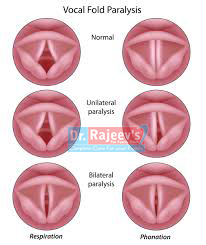


Vocal cord paralysis occurs when the nerve impulses of our voice box (larynx) are disrupted. This results in paralysis of the vocal cord muscles.
Vocal cord paralysis can affect our ability to speak and even breathe. That's because our vocal cords, sometimes called vocal folds, do more than just produce sound. They also protect our airway by preventing food, drink and even our saliva from entering our windpipe (trachea) and causes to choke.
Possible causes include nerve damage during surgery, viral infections and certain cancers. Treatment for vocal cord paralysis usually involves surgery, and sometimes voice therapy.
In most cases of vocal cord paralysis, only one vocal cord is paralyzed. Paralysis of both of our vocal cords is a rare but serious condition. This can cause vocal difficulties and significant problems with breathing and swallowing.
Signs and symptoms of vocal cord paralysis may include:
In vocal cord paralysis, the nerve impulses to our voice box (larynx) are disrupted, resulting in paralysis of the muscle.Exact cause of vocal cord paralysis is unknown.some considerable causes may include:
Breathing problems associated with vocal cord paralysis may be so mild that just have a hoarse-sounding voice, or they can be so serious that they are life-threatening.
Because vocal cord paralysis keeps the opening to the airway from completely opening or closing, other complications may include choking on or actually inhaling (aspirating) food or liquid. Aspiration that leads to severe pneumonia is rare but serious and requires immediate medical care.
Phosphorus-Useful for vocal cord nodule which is accompanied by violent tickling in the larynx, which leads to coughing. Useful when cough worsens with talking and reading. Also there is hoarseness of voice which worsens at night.
Drosera:Useful for vocal cord nodule which is accompanied by dry and irritating cough. There is rough, scraping sensation experienced in throat.Also useful for voice hoarseness.
Belladonna: Useful for vocal cord nodule with voice hoarseness accompanied by larynx pain. Useful for sore and painful larynx with redness of throat and there is difficulty in swallowing food. There is lump like sensation and a constricted feeling in throat.
Iodum: Useful for vocal cord nodule with rough, burning pain in the throat experienced along with hoarseness and roughness of voice.
NEUROPLUS